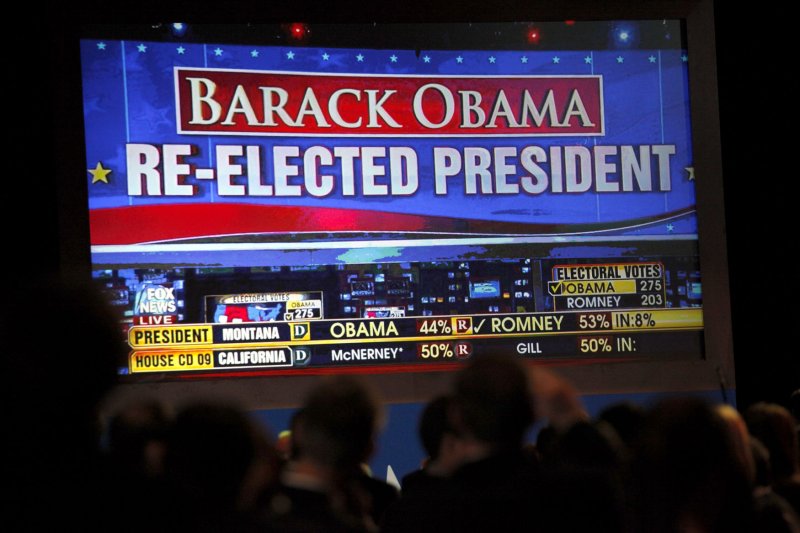1 of 3 | Attendees at the Mitt Romney election night rally in Boston watch a big screen television as election results come in at the Mitt Romney election headquarters on November 6, 2012. UPI/Matthew Healey |
License Photo
CHICAGO, Nov. 7 (UPI) -- Republicans Wednesday analyzed their fifth loss of the popular presidential vote in six elections and began debating the future of the Grand Old Party.
President Barack Obama won the popular vote 50 percent to 48 percent while picking up at least 303 electoral votes to 206 for Mitt Romney in an election GOP strategists thought would be decided early by the weak U.S. economy,
Despite the Republican drumbeat of "jobs, jobs, jobs," Obama retained most of his 2008 political map to victory with high turnouts among African-Americans (Obama won 90 percent), Hispanics (75 percent), Jews, Asians, white women and younger voters -- demographics that made the difference in conservative leaning Virginia, Florida, Colorado and Nevada.
Mitt Romney and Paul Ryan won the votes of white men, conservatives and older voters. Democratic pollster Celina Lake told National Public Radio women are more moderate and see more of a role for government, questioning who the Republicans would "get the economy going for" -- the wealthy or the middle-class,
"The key to victory here is to win women more than we [Democrats] win men," Lake said, adding women voted this year on healthcare and the economy.
The U.S. unemployment rate was 7.9 percent on Election Day but recent government reports showed a generally improving economy heading into the election.
"Our party needs to realize that it's too old and white and too male, and it needs to figure out how to catch up with the demographics of the country before it's too late," American Conservative Union head Al Cardenas told Politico. "Our party needs a lot of work to do if we expect to be competitive in the near future."
Some Republicans believe the GOP's problem is structural, while others blame Romney for waiting too late to pivot to the middle after courting Tea Party support to secure the nomination during the primary season.
Romney moved right on reproductive issues important to women and said he would encourage illegal aliens to "self-deport," alienating Hispanics. The audience at the Republican National Convention in Tampa, Fla., showed a glaring lack of minority delegates.
Republicans "have alienated the Latino vote," Service Employees International Union Secretary-Treasurer Eliseo Medina, told the Los Angeles Times. "It's their choice."
Romney won 27 percent of Hispanics, compared to 31 percent for Sen. John McCain in 2008 and 44 percent for George W. Bush in 2004.
"The conservative movement should have a particular appeal to people in minority and immigrant communities who are trying to make it, and Republicans need to work harder than ever to communicate our beliefs to them," said Florida Sen. Marco Rubio, who was on Romney's short-list for running mate.
Obama led in Florida despite the state's 8.7 percent unemployment rate.
The battleground state of Ohio swung to the Democrats again, ending Romney's hope for Election Night magic. Obama did three points better among whites, largely because of jobs saved by the automobile industry bailout.
Romney's being caught-on-tape at a fundraiser of wealthy donors characterizing 47 percent of Americans who don't pay income taxes as government-dependent victims was one of his campaign's major miscues.
The multimillionaire businessman-turned-politician lost Ohio by 2 percentage points and his 11th-hour Hail Mary play for Pennsylvania failed to produce votes.
Former Bush political strategist Karl Rove, who had predicted a Romney landslide, angrily accused Fox News of calling Ohio for Obama prematurely on-air, Salon reported.
The Republicans retained control of the House of Representatives but their second consecutive presidential election defeat is forcing some to question the party's shift to the far right in 2010. Some wonder whether the party will change or self-destruct.
"There will be some kind of war," Republican consultant Mike Murphy told the New York Times. He said with generational change the party cannot write off the votes of blacks, Hispanics, younger voters and college-educated women.
"We are in a situation where the Democrats are getting a massive amount of free votes," Murphy said.
Murphy said "mathematicians" like him likely would be at war with conservative movement "priests" who believe it was a mistake to nominate a centrist like Romney.
"You are going to see a continuation of the fight between the old guard and all of the new blood that has come in since 2010, but I don't know how dramatic it is going to be," Matt Kibbe, president of far-right FreedomWorks told the Times.
"It is getting to the point where you can't reach back and pull another establishment Republican from the queue like we have done with Romney."
The Times said the next leading conservative Republican voices, besides Rubio and unsuccessful vice presidential candidate Ryan of Wisconsin, would be Sen. Rand Paul of Kentucky, Wisconsin Gov. Scott Walker, Virginia Gov. Bob McConnell and Louisiana Gov. Bobby Jindal.
More moderate possible party leaders include former Florida Gov. Jeb Bush and New Jersey Gov. Chris Christie, who governs a Democratic majority state.
"They need a Bill Clinton moment," said Chicago Mayor Rahm Emanuel, who was a top aide for both Clinton and Obama.
"There has never been a credible political party in America that has opposed immigration," said Senate Majority Whip Dick Durbin, D-Ill., during a radio panel analyzing the election in Chicago. "When you went to the Romney headquarters, it was rare to find a person of color."















